- Home
- Linda Newbery
Quarter Past Two on a Wednesday Afternoon
Quarter Past Two on a Wednesday Afternoon Read online
Contents
Cover
Title Page
Dedication
Chapter One
Chapter Two
Chapter Three
Chapter Four
Chapter Five
Chapter Six
Chapter Seven
Chapter Eight
Chapter Nine
Chapter Ten
Chapter Eleven
Chapter Twelve
Chapter Thirteen
Chapter Fourteen
Chapter Fifteen
Chapter Sixteen
Chapter Seventeen
Chapter Eighteen
Chapter Nineteen
Chapter Twenty
Chapter Twenty-one
Chapter Twenty-two
Chapter Twenty-three
Chapter Twenty-four
Chapter Twenty-five
Chapter Twenty-six
Chapter Twenty-seven
Chapter Twenty-eight
Chapter Twenty-nine
Also by Linda Newbery
Copyright
For Linda Sargent – writer, guide, friend, polisher of sea-glass.
Thank you.
August 1990
It was the day when everything stopped, and something started that was quite different, that couldn’t be controlled or shaped or ended. From then on, a ringing telephone could terrify; a knock on the front door could numb the house into petrification.
Prompted at first by her parents, then by the police, and ever after by her own search for overlooked significance, Anna went over and over the events of the morning, the lunch time, and her parting from Rose. She replayed and replayed until she couldn’t tell if she was really remembering what happened. Maybe she was only recalling memories.
For Anna it had started as an uneventful weekday in the summer holidays, a Wednesday. Mum and Dad were at work, and the girls spent most of the morning in Rose’s room, Rose sketching with the radio on, Anna sprawled on the bed, reading. Early haze cleared to unbroken sunshine; after a sandwich lunch, Rose fetched the garden lounger from the garage and put it under the pear tree, then sat sideways to paint her toenails before settling with a book. Bored with being at home, Anna decided to go the shops.
‘See you later,’ she called from the back door, and Rose, already engrossed, replied without looking up. What were her exact words? Anna couldn’t remember, though in the days to come she strained to hear, squeezing her eyes tight shut to open her ears to the echo of what she’d missed. Rose had said nothing, she was sure, about going out, or meeting anyone. She looked as if she intended to stay all afternoon in the quiet of the garden, reading and sleeping in the tree’s dappled shade.
Asked what time this was, Anna thought it must have been about a quarter past two, because the radio was still on in Rose’s bedroom and she’d heard the two-o’clock pips as she went upstairs. Some two hours later she returned, letting herself in with her own key. She had felt no more than mild surprise to find the house empty, the garden deserted. Sometimes, still, she dreamed of returning to that day and making it so ordinary that it would merge into dozens of similar featureless days. Rose would be in the garden, or if not she would soon come home, preoccupied, a little impatient at being questioned. But there.
No sign of a breakin; the police asked her closely about that. No sign of anyone having visited. Nothing any different from how it usually was. The blue garden lounger was there under the tree, with an empty glass tipped over on the grass. Anna poured a cold drink, took Rose’s purple varnish and painted her own toenails, although it was forbidden by Mum, who said that Anna was too young, so she’d have to keep her feet hidden in socks and shoes. Soon after five, Mum returned from work and asked where Rose was; six o’clock came, and seven, and now Dad was home as well. At eight-thirty, Mum phoned Rose’s friend Christina. No, Chrissie hadn’t seen Rose that day, and had no idea where she might have gone. They’d spoken on the phone last night, when Chrissie got home from her holiday, and were to meet tomorrow, A-Level results day. They planned to be at school to open their envelopes together, compare results and go into town to celebrate or commiserate.
Anna didn’t see why Mum was getting so worked up; it wasn’t particularly late. Dad reassured them both that everything was fine, that Rose would be back any moment now. She’d met someone she knew, or she and Jamie had got back together and were making up for lost time. Or, likeliest of all, Dad said, she was anxious about her A-Level results. ‘Remember the state she got into about her O-Levels?’
‘GCSEs, Dad,’ Anna corrected.
‘You know she’s set her heart on getting three As,’ said her father. ‘Let’s hope to God she gets them. It’s the waiting, it’s got to her. She’s met someone from school, gone home with them.’
‘She’d have phoned,’ Mum said flatly; it was her reply to all his suggestions. ‘She wouldn’t stay out without telling us.’
‘She’s eighteen now, love, old enough to take care of herself. We’re not going through this every time she goes out for the evening. She’ll turn up, right as rain.’ Dad kept saying that, as if saying it over and over could make it so.
Sent up to bed, Anna stood for a while with her elbows on the windowsill, looking out at the garden. Dusk was falling now; the shrubs were heavy with leaf, and it had begun to rain – light, refreshing rain that Anna could hear through the open window as a faint hissing, and smell as wetness on dry earth. It was almost the middle of the school holidays. At first, the six weeks had stretched out with no end in sight, but already the nights were creeping in earlier. It didn’t seem fair that midsummer, the longest day, was back in June, before the holidays had even started. After what Dad called ‘the year’s turning’, the days immediately began to shorten towards autumn and September, and the return to school.
In bed Anna propped herself up, reading Forever, her library book, anticipating drama, and the earful Rose would get when she turned up. Eventually she turned off her light. It was a way of hastening Rose’s return; when she woke up it would be morning, Rose would be asleep in her room, and no one would remember why they’d been so worried.
But she woke instead to Mum’s voice from the downstairs hall. ‘It’s Sandra Taverner, Rose’s mother. I’m sorry to bother you so late, but we’re a bit worried about where Rose is. She’s not with Jamie? No, no. Yes, I know, but I thought perhaps …’
And it was still dark; not morning, but a few minutes before midnight. Anna sidled to the top of the stairs. Her mother stood for a moment still holding the phone, then replaced it and went back into the sitting room. Surely Rose would come in at the stroke of midnight, or risk being turned into someone else or frozen into a statue. Anna waited, her eyes on the front door, confident. The hands of her watch aligned themselves at twelve, and the minute hand moved barely perceptibly into the frightening orbit of next day. It was tomorrow now, and Rose hadn’t been here since yesterday, and that made it immensely more serious.
She crept halfway down the stairs.
‘I’m going to phone the police,’ her mother was saying.
‘Don’t you think we should—’
‘No! No! I can’t wait any longer!’ And now Mum’s voice rose in a wail; she ran to the telephone table in the hall, both hands clamped to her mouth. Seeing Anna, she stopped dead. Dad followed, put an arm round her shoulders and led her back into the sitting room. He hadn’t seen Anna huddled on the stair, shivering in her pyjamas.
She heard him say soothing words, and Mum’s quiet sobs. When he came back to the phone there was a long moment of breathing as he reached for the receiver, hesitated, then picked it up. He was going to dial 999,
Anna supposed, and although this was exciting she wanted to yell at him No, don’t, because to make that phone call was to stop pretending everything was normal, and to move into a new phase.
‘I want to report a missing teenager,’ Dad said. ‘Yes, yes. My daughter.’
Chapter One
She is thinking of her garden.
Soon it will be snowdrop time. Maybe already they’re stirring underground, getting ready to push through frozen earth. Each year there are more, their circle widening like ripples. She has planted them in the green to encourage them to spread, after they flowered, when the stems wilted softly and the small bulbils could be trowelled up and separated. Last year she did that, and the year before, and the year before. Two or three weeks from now, she’ll have her reward: the lawn under the pear tree will be pooled white, as if the tree has sprung into blossom early and dropped its flowers wet and shining into the grass. Soon after that will come the hellebores, and the first daffodils, and then the great rush of spring that comes upon her every year with no time to register each change.
Now, in the hollow after Christmas, everything seems frozen into suspension, waiting for the date that will soon be marked on the calendar. The end. The beginning. On that day, yet to be decided, she and Don will walk out of the house and hand over the keys and never come back. She would never have believed she could do it, but it’s easy after all. She can register quite dispassionately that the Christmas just gone is the last one here. There will never be another summer. Almost certainly she’ll see the hellebores and the tête-à-tête narcissi, but by the time her roses flower (Cécile Brunner, Veilchenblau, The Pilgrim; she loves the names as much as the roses themselves) the house will belong to the Baverstocks. ‘It’s what the house needs,’ Don said, after phoning the estate agent to accept the offer. ‘After so long.’
Yes. The house has been waiting for years, echoing to the memory of children’s voices. For too long the rooms have been full of absence, full of reproach. Now it will be a family home again.
‘You’ll love working on a new garden. You can take some of your favourites with you,’ Anna has suggested; ‘divide them, or dig them up altogether?’
But that would have meant starting two or three months ago, in the autumn, assembling a nursery of cuttings and divisions. Now isn’t the time, with the ground hard-frozen. Something obstinate in her refuses to salvage. Instead, she’ll walk away, leaving her treasures behind. It will be a final parting. Isn’t that the point?
The estate agent brought the Baverstocks on their first and second viewings, but on their third visit, with the offer accepted and solicitors engaged, they came un accompanied, to take measurements for curtains and furniture. Don did most of the talking, while she smiled and made tea and listened, retreating into silence.
‘We’ve looked at so many, but this is the house for us. And it’s the garden that sold it to us.’ Mrs Baverstock was a young woman of, surely, Rose’s age, sleekly casual. ‘It’ll be wonderful for the boys.’ Too sure of herself, assuming the right to have anything she wants. The husband had a notebook and an air of wanting to get on with things, looking around the room as if for flaws.
Three boys, they told Don in answer to his questions; eight, ten and five. They asked about schools. They expressed polite interest in the house in Cranbrook, in the reasons for the move; Don said that it was time for a change, for downsizing.
They can’t wait for us to move out, she thought, so that they can take over, bringing their boys and their noise. They’ll dig up my plants and install decking and a swing, a barbecue.
‘It’ll be a wrench, I’m sure.’ Mrs Baverstock has asked them to call her Joanne, and her husband Tim; but, having taken against them for planning to live here, she doesn’t intend to call them anything. ‘Your children grew up here, did they? That’s a lot of memories to leave behind.’
Children. They’d seen Rose’s room, of course. They’d tramped in, talking loudly about bunk beds for the two older boys.
She knows Don can’t lie. He nodded, looking at her uneasily, but this time she did speak. ‘A daughter, Anna. She lives in London.’
What business of theirs, anyway?
‘Boys!’ she said to Don, when they’d gone. ‘I can’t see this as a boys’ house. Boys in my garden! They’ll kick footballs. Scuff the lawn. Break stems off plants.’
‘Come on, love. It can’t be helped. And you’ll have your new garden.’
Always, to hold herself steady, the garden is where she retreats. Mentally she places herself in dappled light under the pear tree, looking across at the wide border and the massed flowers of the Veilchenblau rose – mauve, almost blue, against the fence.
And whenever she wants to, if she listens, she hears the girls’ voices, one calling to the other from the swing, or Rose giving Anna instructions. Eventually they will come in, hungry, in search of biscuits, or choc-ices from the freezer: Anna with dirty fingernails and dishevelled hair, Rose as if from a world of her own devising. There they are, playing, secure in the green enclosure of childhood, where it is always summer.
Anna was painting the bedroom walls. Martin was at Ruth’s today, and she’d decided to get on with the job alone, to surprise him when he came in. As soon as he left, she caught a bus to B&Q, taking a taxi back with her purchases; then she changed into jeans and an old T-shirt, moved and covered the furniture, and spread newspaper over the carpet. The hours passed in a succession of radio news and CDs, mugs of coffee going cold on the windowsill while she painted and painted.
She and Martin had put off the job of redecorating, getting only as far as choosing a colour. Now, giving the whole day to it, she found an unexpected pleasure in the task: the dip into cool green, the loading of the brush with enough but not too much paint, the nudge against the side of the tin; then the custardy glide, as scuff-marks and small blemishes disappeared beneath a skim of perfection. It was years since she’d painted. The feel of the brush in her hand recalled the art rooms at school and at college, years ago when there had been time to think of nothing but making marks on paper or board. Then, earning a living had seemed irrelevant, a worry she needn’t face yet; devoting herself for hours on end to the picturings of her imagination could be seen as a virtue. An artistic future had surely been her due, waiting for her to claim it. She had almost forgotten, but this felt good, the ache in her neck and arm as she edged colour along below the cornice, standing on a stool to reach. Stepping down to the floor, she admired her work, the stretch of wall gleaming and flawless.
Martin had suggested that her picture could hang here, above the bed, but now Anna wasn’t sure. Expecting him to dismiss it as immature, she’d felt touched that he liked it and thought it too good to be hidden in a cupboard. She washed her hands and went to fetch it from the spare room, laying it on the old curtains spread over the bed.
For her A-Level exhibition she had given it the title Shore. In a tall, narrow frame, it showed a stretch of shoreline, low tide lapping at the left-hand frame. In the foreground, the prints of bare feet were sharply delineated, fading into the tideline as they receded to the small, indistinguishable figure walking alone by the sea’s edge. Only her art teacher had understood that she meant the title ironically: Shore, when she was sure of nothing but absence and uncertainty. The painting asked a question that had never been answered, even now.
Anna admired the light through sea-mist, the smudged suggestion of low cliffs at the horizon. I painted that, she thought, wondering if she could still do as well. Perhaps she ought to make time, join a class; there were plenty of opportunities. She had forgotten what it meant to her, back in the days when she was never without a sketchbook and pencils. But – she angled her gaze at the picture, and at the point on the wall where she supposed it might hang – did she really want to invite Rose into the bedroom? To install her, even that imagined glimpse, above the bed?
She would stow it back in the cupboard, after all; tell Martin that she didn’t like it any more, a
nd they could choose something together, something new. She slid the picture back into its sleeve of corrugated cardboard, thinking that next time she went home she’d take it with her, replace it in the portfolio with the rest of her work.
Home – she was doing it again. Home was not here but her parents’ house, the home that would soon belong to someone else. It was the only real home she knew; everything since had been temporary, and after more than a year she still thought of this flat as Martin’s. Home was Sevenoaks, the quiet cul-de-sac, the shady garden, her old bedroom. Once her parents moved out, it would be gone from her life, an idea she was finding impossible to grasp. She had been astonished – dismayed too – by her mother’s decision to leave, but, knowing that her father thought it a good thing, had helped all she could, searching RightMove, making contacts, even accompanying them on some of their viewings. Soon everything would be packed up and moved; she’d have to go through the belongings stored in her bedroom and in the loft, and either bring them here or dispose of them. More significantly, Rose’s things would have to be confronted, and decisions made. Who would do that?
In her parents’ spare bedroom – Rose’s room – Anna’s student portfolio was kept in the cupboard. She hadn’t looked at it since the time when Martin had shown an interest, but the other Rose picture, the watercolour she’d kept back from the exhibition because it was too private, was among the paintings and sketches stored there. It showed the garden, and the pear tree where the swing had been hung when she and Rose were children. Anna had painted Rose under the tree, reading: bare legs stretched out, feet with toenails newly painted a dark and somehow provocative purple. The bottle of nail polish was on the grass beside the lounger. Sunlight dappled Rose’s face and glossed her hair; her head and shoulders turned towards the onlooker with an expression that was partly smug self-containment, part annoyance at being interrupted.

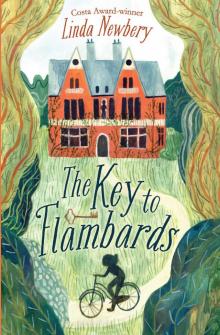 The Key to Flambards
The Key to Flambards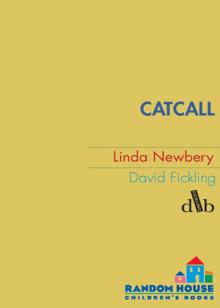 Catcall
Catcall Sisterland
Sisterland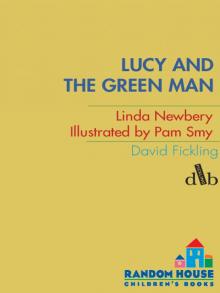 Lucy and the Green Man
Lucy and the Green Man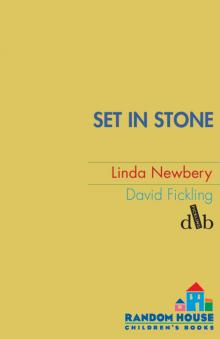 Set In Stone
Set In Stone Lob
Lob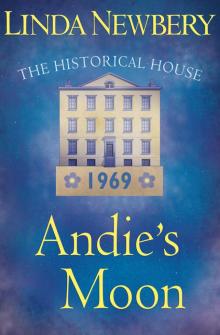 Andie's Moon
Andie's Moon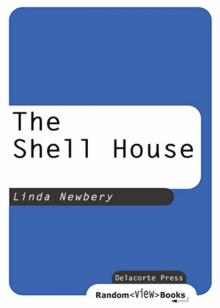 The Shell House
The Shell House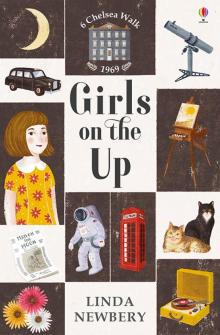 Girls on the Up
Girls on the Up The Sandfather
The Sandfather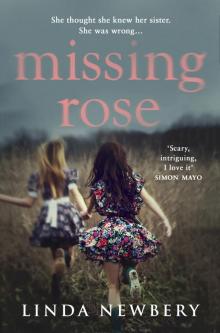 Missing Rose
Missing Rose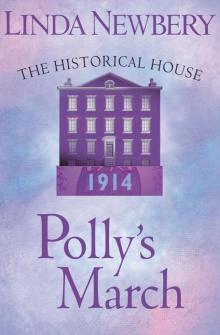 Polly's March
Polly's March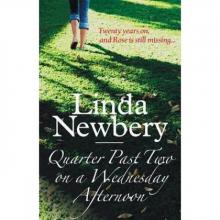 Quarter Past Two on a Wednesday Afternoon
Quarter Past Two on a Wednesday Afternoon Flightsend
Flightsend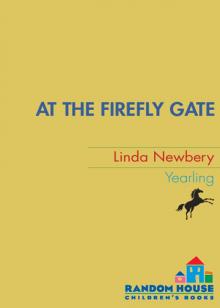 At the Firefly Gate
At the Firefly Gate